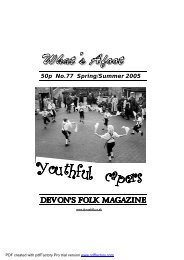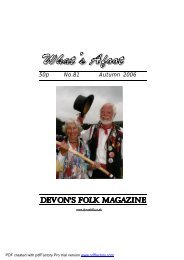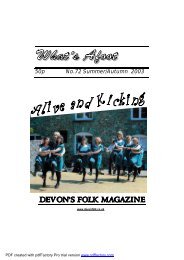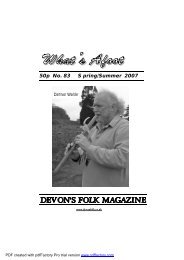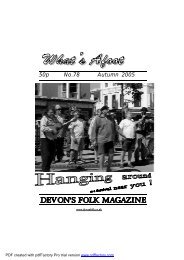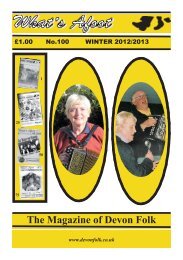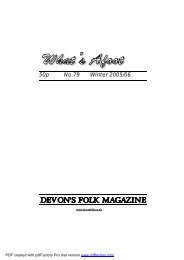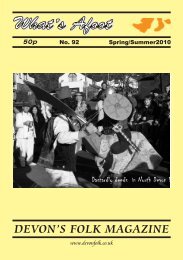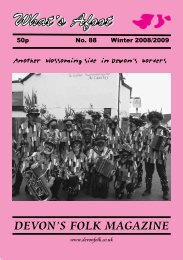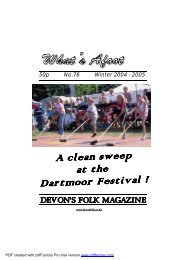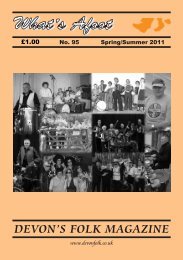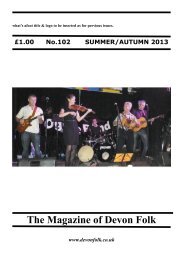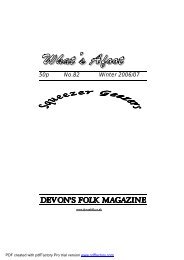SPRING/SUMMER 2013 No. 101 - Devon Folk
SPRING/SUMMER 2013 No. 101 - Devon Folk
SPRING/SUMMER 2013 No. 101 - Devon Folk
- No tags were found...
Create successful ePaper yourself
Turn your PDF publications into a flip-book with our unique Google optimized e-Paper software.
and Barbara Brown, currently involved in the<br />
Short Sharp Shanties Project (John Short lived<br />
just over the border on the <strong>No</strong>rth Somerset coast);<br />
and great song-writers like Cyril Tawney, many<br />
of whose powerful songs have now become<br />
part of the ‘tradition’ of <strong>Devon</strong>. And we have<br />
many small venues, such as The George at South<br />
Molton, where big names like Martin Carthy and<br />
Dick Gaughan are happy to come and play.<br />
We have some ‘big names’ in <strong>Devon</strong> too: Seth<br />
Lakeman comes from a family rooted in the<br />
traditions of Dartmoor, and the songs he writes<br />
stem from that tradition; Show of Hands (based<br />
in Topsham) perform traditional songs as well as<br />
their own, including Steve Knightley’s haunting<br />
version of Widecombe Fair in which a young man<br />
is murdered for courting a girl already spoken for<br />
‘on the Whiddon Down Road’. ‘Roots’, Show<br />
of Hands’ riposte to a politician who said that his<br />
idea of hell was ‘three folk singers in a pub near<br />
Wells’ reclaimed and re-asserted the importance<br />
of the traditional songs, music and customs of<br />
England, but as their example shows, folk song is<br />
not a dead tradition: it needs to be re-thought, reworked<br />
and enjoyed again by every generation.<br />
Jim Causley is a ne example of this practice:<br />
his recent CD, Dumnonia, is a fresh and lively<br />
collection of mostly traditional songs from the<br />
county, some recently revived from the singing of<br />
John Shepherd, the ‘mayor’ of Whimple. Honiton<br />
Lace, written by Martin Graebe (also strongly<br />
connected to Wren Music) uses the words of<br />
a Honiton lacemaker from a letter dated 1897<br />
which he found in the Rougemont Museum, and<br />
Royal Comrade is a version of Young Leonard<br />
which Jim learned from the west country Romany<br />
singer Amy Birch.<br />
But just as important as all of this are the many<br />
informal folk clubs, singarounds and sessions<br />
held in <strong>Devon</strong> pubs most days of the week, where<br />
those of us who love singing and listening to<br />
traditional song can nd a home and a welcome.<br />
In this column I will be interpreting the term<br />
‘traditional’ quite loosely, and reecting on the<br />
ways in which songs become ‘traditional’ through<br />
their informal performance in the pubs and clubs<br />
of our lovely muddy county.<br />
www.shammickacoustic.org.uk<br />
enquiries: 01271 882366<br />
16



